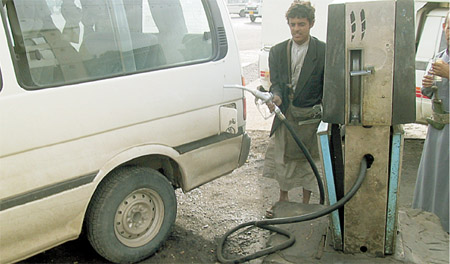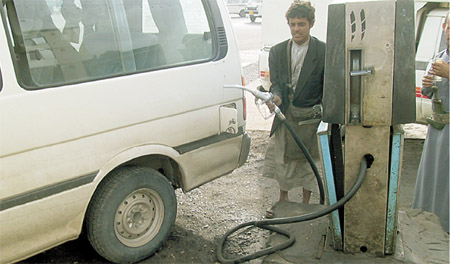
Increase in Diesel Prices: Opinion Polls in Three Cities of the Republic [Archives:2001/32/Reportage]
August 6 2001

In Yemen, everything begins with a rumor that spreads like wildfire among the population. Lastly this rumor dies and another one starts again. Suddenly, what we see is not a rumor anymore but a Republican decree issued by the government to ratify this rumor. After the increase in diesel prices, another rumor is saying that gas price also rose. But the question which haunts millions of Yemenis is the following: why did only diesel prices increased? Some say that the increase in diesel prices comes from the fact that the Yemeni citizen does not benefit from the material itself. Others say that the rise can be attributed to a willingness to reduce pollution caused by diesel engines. It is also said that the General Administration for Traffic instructed not to issue any registration plates to diesel-powered vehicles. Our main concern is focused on the common man who does not pay attention to the income calculations or economic reforms, but waits only to swallow the bitter pills of any economic new decisions.
Sharp increase in diesel prices:
negative aspects.
Undoubtedly, the rise in diesel prices will affect negatively consumers of water, electricity, agricultural products and bread. Furthermore, farmers and fishermen will insist on increasing the price of their agricultural and fish products. The poor common man found mainly among blue-collar workers and craftsmen, will be without any doubt the first victim of this new decree. He is greatly suffering from unemployment and miserable living conditions. In Taiz, after the sudden increase in diesel prices, the inhabitants also witnessed an augmentation in the price of bread sold in bakeries and groceries and that upset them. The Yemen Times reporter Farook Al-Kamali met Mr. Ahmad Salem Shammakh, the General Director of Shammakh company for Tanning Skins. During the interview, Shammakh commented on the diesel prices increase and the possibility to evaluate its cost on the farmers’ and manufacturers’ incomes. Furthermore, this decree will have a negative impact on living conditions and on the development ratio as well, as it will lead to recession. He added that diesel is officially shipped from accredited harbors and not smuggled as mentioned. He also said,
” Suppose that some of these quantities are smuggled. It is clear that the influential citizens are involved in this activity. But, instead of performing its duties, the government looked away and punished the poor citizen instead”. Mojeeb Ahmad Saeed, a student, considers the high increase of bread prices to be a ignonimous act against the rights and the freedom of the common man. If such matters happen in other countries in the world, demonstrations would be staged and ministers and governments would be overthrown. In Yemen, such a thing is considered normal by Yemeni citizens who neglect their rights and choose to remain silent. Abdullah Kaed, a baker, stresses out that only two choices are possible: either increasing the prices of bread, or reducing its size. Abduh Al-Naser Sarhan, owner of a diesel-powered bus, states, ” Bus drivers have recently changed their petrol engines into diesel engines, but the price of the of engines are too expensive. Certainly, we will be terribly affected by the increase in diesel prices but we will be unable to augment the bus fares to reflect the new diesel prices”. Abdulaziz Ahmad and Nagi Mohsen, both farmers in Alhayma, remark that the diesel prices increased by nearly 70% so that the cost of using diesel to pump water from wells as a mean of irrigation jumped by 25%. As a consequence, they will have to increase prices of their agricultural products. At the same time, the farmers see prices of agricultural products to follow the diesel prices.
The increase in diesel prices can be beneficial. Yet, the amount of money together with agricultural fund must be transferred to the farmers in order to compensate them and set up irrigation projects like dams. Moreover, based on my various discussions, I am of the opinion that the farmers will reduce their water consumption by using rainwater instead of depletable water resources.
In Sana’a, Yemen Times reporter Yaser Ahmad interviewed some citizens and came back with the following comments: Saeed M. M. says that the increase in diesel prices does not only mean the increase in diesel prices alone but also a overall augmentation in prices but especially in transportation and diesel engines. The farmer is going to be affected, as he is unable to provide diesel. We met another citizen, Mr. Mokbel Abduh M. stating that if the increase in the diesel prices is meant to stop the diesel-powered engines, then why is there no supervision on those vehicles?
Another comment came from Abdulrab Al-Baydhani who told us that it was a sudden shock to all the Yemenis. The government has not been satisfied with the previous economic decisions and intentionally plans to implement another program which will make life of the Yemeni people even harder in a time of large unemployment and other things which have become a heavy burden on the government. But Mohammed Abdullah Al-Otmi feels sorry for such regrettable things. “This is the time for the government to cease applying its usual remedies and increasing the prices of diesel, which ultimately means an increase in the price of everything else.
In Aden, the Yemen Times Bureau Chief Redhwan Al-Saqqaf conducted a survey and opinion polls on the same issue, that is the high increase in diesel prices. Yemen Times interviewed for this purpose a number of citizens in the city. Ali Al-Baydhani, a bus driver says, “We have been informed that diesel prices are going to rise. These news irritated us. But the population should not be annoyed because diesel remains cheaper than gasoline prices. In fact, it motivates the bus drivers to switch to diesel engines and demand for diesel becomes more attractive than for gasoline. Khaled Salem, a gas station worker, states, “Regrettably, the number of diesel engines have grown too fast and have overtaken the number of gasoline vehicles.” We also met Mohammed Hashem, a taxi-driver, who insisted that he uses a gas-powered his car which proves to be very costly, but he cannot raise its fares because of the strong competition from owners of diesel-powered vehicles. This motivated him to switch from a gasoline engine to a diesel engine. Abu Majed, a lorry driver, said, ” The government increased the diesel prices but will sooner or later think about also raising gasoline prices. All these decisions will be made at the expense of the common man.” Abu Majed stressed out that there would be a negative impact on the issue of unemployment. In Lahj, a farmer, Ahmad Ali, added that he owned water and electricity generators and a tractor as well using large quantities of diesel. And, because of that, he would have to reconsider the pricing of his products. Commenting on the deteriorating situation of the Yemeni farmers, Ahmad Ali made clear that there were no interest at all from the government in their situation. Abdualnaser Al-khateeb said that the government would increase the diesel prices but the ratio was simple and did not constitute an hassle. He added that this had a great impact on man and environment. According to Alkhateeb, the government also seriously wants to reform the situation and to focus on decreasing unemployment in the country.
——
[archive-e:32-v:2001-y:2001-d:2001-08-06-p:./2001/iss32/report.htm]


